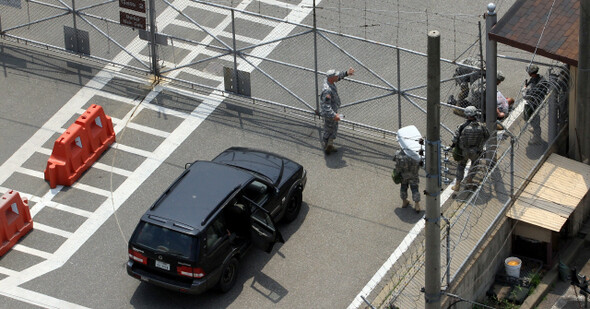hankyoreh
Links to other country sites 다른 나라 사이트 링크
[Editorial] Let’s not get left cleaning up US military bases’ polluted mess

The government has reportedly agreed to the return of two US military bases in Busan and Dongducheon without pollution cleanup efforts by the US. This kind of policy is certain to leave South Korea footing a huge bill to clean up oil and heavy metal contamination. It’s also far from the first time this has happened. Most recently, we were stuck with payment for the cleanup when Busan’s Camp Hialeah was returned in 2010. More troubling still is the fact that the US keeps ignoring established rules between the two countries on the handling of base contamination. If the rules are just for show, then they ought to be replaced with something binding.
The rules for handling contamination when military base land is returned are straightforward: the party that caused contamination pays for its removal. It’s a rule that should be applied here. It’s been an effective international practice behind rational use and distribution systems for environmental resources. Many have recently been saying the cleanup costs should also extend to pollution prevention, environment restoration, relief for victims, and the costs of pollution avoidance. This principle - that the party responsible for pollution has to clean it up when providing or returning a base - is also stipulated in the Status of Forces Agreement (SOFA) between South Korea and the US.
The problem is that the US keeps trotting out one excuse after another for not following the rule. A Joint Environmental Assessment Procedure (JEAP) was eventually set up to avoid a bad precedent after South Korea got 23 US bases back in 2007 without any kind of cleanup. By the standards of that procedure, the two bases at issue have been found hazardous, with dangerous levels of cadmium, flourine, and lead over nearly half their sites. But the US has apparently dodged responsibility for their cleanup, claiming the sites don’t present an imminent, real, and widely recognized threat to human health. It’s an attempt to disregard international practice, the principles of SOFA, and the aims of the JEAP system. When you’re returning land you borrowed from another country, common sense says the break should be a clean one in both senses of the word. That sort of common sense is nowhere in sight.
Another problem with this picture is the way the ministries of Foreign Affairs and National Defense have been trying to keep everything under wraps about the way they’re getting dragged around by the US. They deserve whatever jabs they’re getting for their meekness and lack of bargaining ability. The two sides apparently agreed on the handling of these two sites first as part of a negotiation on the return of five sites in total. There are also another 27 bases predicted for return beyond that. One of them is enormous Yongsan Garrison. In other words, this is no minor issue. It’s not right to do things in drabs like this, focusing on just one or two bases at a time. We need to stop negotiating the terms for single bases and adopt a new approach by revising SOFA to include rules and concrete procedures for pollution.
Please direct questions or comments to [english@hani.co.kr]

Editorial・opinion
![[Column] Season 2 of special prosecutor probe may be coming to Korea soon [Column] Season 2 of special prosecutor probe may be coming to Korea soon](https://flexible.img.hani.co.kr/flexible/normal/500/300/imgdb/original/2024/0426/3317141030699447.jpg) [Column] Season 2 of special prosecutor probe may be coming to Korea soon
[Column] Season 2 of special prosecutor probe may be coming to Korea soon![[Column] Park Geun-hye déjà vu in Yoon Suk-yeol [Column] Park Geun-hye déjà vu in Yoon Suk-yeol](https://flexible.img.hani.co.kr/flexible/normal/500/300/imgdb/original/2024/0424/651713945113788.jpg) [Column] Park Geun-hye déjà vu in Yoon Suk-yeol
[Column] Park Geun-hye déjà vu in Yoon Suk-yeol- [Editorial] New weight of N. Korea’s nuclear threats makes dialogue all the more urgent
- [Guest essay] The real reason Korea’s new right wants to dub Rhee a founding father
- [Column] ‘Choson’: Is it time we start referring to N. Korea in its own terms?
- [Editorial] Japan’s rewriting of history with Korea has gone too far
- [Column] The president’s questionable capacity for dialogue
- [Column] Are chaebol firms just pizza pies for families to divvy up as they please?
- [Column] Has Korea, too, crossed the Rubicon on China?
- [Correspondent’s column] In Japan’s alliance with US, echoes of its past alliances with UK
Most viewed articles
- 1‘We must say no’: Seoul defense chief on Korean, USFK involvement in hypothetical Taiwan crisis
- 2Is Japan about to snatch control of Line messenger from Korea’s Naver?
- 3No good, very bad game for Korea puts it out of Olympics for first time since 1988
- 4Samsung subcontractor worker commits suicide from work stress
- 5[Editorial] Korea’s surprise Q1 growth requires objective assessment, not blind fanfare
- 6Division commander ordered troops to enter raging flood waters before Marine died, survivor says
- 7N. Korean delegation’s trip to Iran shows how Pyongyang is leveraging ties with Moscow
- 8Korea’s 1.3% growth in Q1 signals ‘textbook’ return to growth, says government
- 9Flying “new right” flag, Korea’s Yoon Suk-yeol charges toward ideological rule
- 10[Column] Park Geun-hye déjà vu in Yoon Suk-yeol